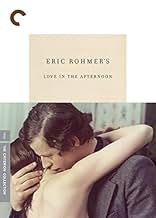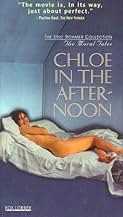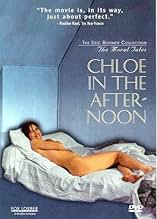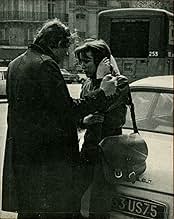हालाँकि उसकी एक बहुत ही प्यार करने वाली पत्नी है, फिर भी एक रुढ़िवादी पुरुष दूसरी महिलाओं को पाने के लिए आकर्षित है.हालाँकि उसकी एक बहुत ही प्यार करने वाली पत्नी है, फिर भी एक रुढ़िवादी पुरुष दूसरी महिलाओं को पाने के लिए आकर्षित है.हालाँकि उसकी एक बहुत ही प्यार करने वाली पत्नी है, फिर भी एक रुढ़िवादी पुरुष दूसरी महिलाओं को पाने के लिए आकर्षित है.
- पुरस्कार
- कुल 1 जीत
- Martine
- (as Babette Ferrier)
कहानी
क्या आपको पता है
- ट्रिवियाThis film is part of the Criterion Collection, spine #348.
- गूफ़At approximately 1:16 in the film, Chloe opens the store door wearing red shoes matching her dress. In the following scene, she walks down a staircase wearing black shoes which match her stockings.
- भाव
Frédéric: [voice over] That's why I love the city. People come into view, then vanish. You don't see them grow old. What makes the streets of Paris so fascinating is the constant yet fleeting presence of women whom I'm almost certain never to see again. It's enough that they're there, indifferent, conscious of their charm, happy to test its affect on me, as I test mine on them, by tacit agreement, without even the subtlest smile or glance. I feel their seductive power without giving in to it. This doesn't estrange me from Hélène. Far from it. I tell myself these passing beauties are simply an extension of my wife's beauty. They enrich her beauty and receive some of hers in return. She's the guarantee of the world's beauty and vice versa. When I embrace Hélène, I embrace all women.
- कनेक्शनFollows La boulangère de Monceau (1963)
When Chloe (Zouzou), a free-spirited friend he used to know shows up, Frederic finds a release in her companionship and is able to confide in her in a way that he is unable to do with his wife. They spend afternoons together talking about love and relationships. She confesses that she doesn't want to be married but would like to have a child, particularly one with Frederic. The central tension of the film is the choice Frederic must make between his passion for Chloe and his love for his wife. Although he is tempted to have an affair with Chloe, he spends too much time pondering the pros and cons and doesn't act. Chloe on the other hand is in love with Frederic and has a come-what-may attitude toward his entanglements.
Like Jerome (Claire's Knee) and Jean-Louis (My Night at Maud's), Frederic is weak and indecisive and is forever attempting to justify his inability to choose. He stands on the edge of temptation but is never quite ready to jump. Rohmer does not, however, make any moral judgments but hints that Frederic's temptation and pangs of conscience are something most of us go through at some time in our lives.
Though there is a lot of talking in Chloe in the Afternoon, it never seems false or tiresome. This is a very charming film that Pauline Kael called "in every respects, a perfect film". It has a natural rhythm with characters that are so real that you don't want to leave them when the film ends. As Frederic's ultimate choice looms, we are privy to some sharp and insightful dialogue that illuminates the complexity of relationships. The story is told from the husband's point of view and we are left wondering how different it would be if told by his wife. Her tears at the end provide a clue.
- howard.schumann
- 27 अक्तू॰ 2002
- परमालिंक
टॉप पसंद
विवरण
बॉक्स ऑफ़िस
- दुनिया भर में सकल
- $3,520
- चलने की अवधि1 घंटा 37 मिनट
- ध्वनि मिश्रण
- पक्ष अनुपात
- 1.37 : 1
इस पेज में योगदान दें


![Bande-annonce [OV] देखें](https://m.media-amazon.com/images/M/MV5BNDVkYjA1MTItYWFjMi00ZTQ3LTg2NGQtZmZhOTg4MjU1MTg4XkEyXkFqcGdeQXRyYW5zY29kZS13b3JrZmxvdw@@._V1_QL75_UY281_CR5)

























